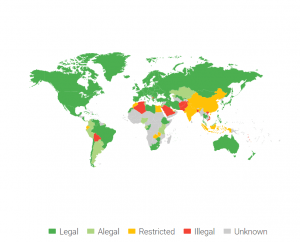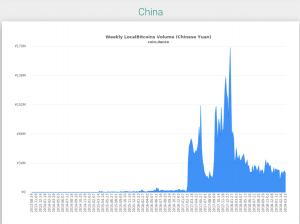- Countries Where Bitcoin Is Banned or Legal In 2021
- Countries where Bitcoin is banned
- Countries where Bitcoin is legal
- Countries where Bitcoin is neither legal nor illegal
- Bitcoin: El Salvador makes cryptocurrency legal tender
- Countries Where Bitcoin Is Legal – Current Global Status
- So, is bitcoin legal?
- Where Bitcoin is Legal – Full list of countries
- North America
- The USA – Legal 🟢
- Canada – Legal + Banking restrictions 🟢+🟠
- Mexico – Legal 🟢
- South America
- Argentina – Legal 🟢
- Bolivia – Banned ❌
- Colombia – Legal + Banking restrictions 🟢+🟠
- Ecuador – Legal +Usage restrictions 🟢+🟡
- Venezuela – Legal 🟢
- Africa
- Algeria – Banned ❌
- Egypt – Banned ❌
- Morocco – Banned ❌
- Namibia – Legal +Usage restrictions 🟢+🟡
- Ghana & Kenya – Legal🟢
- Nigeria – Banned ❌
- South Africa – Legal🟢
- Asia – Middle east
- Bahrain – Restricted ⭕
- Iran – Legal + Banking restrictions 🟢+🟠
- Iraq – Banned ❌
- Israel – Legal 🟢
- Kuwait – Legal + Banking and Usage restrictions 🟢+🟠+🟡
- Qatar – Banned ❌
- United Arab Emirates – Banned ❌
- Asia – East Asia and the Pacific
- Australia – Legal 🟢
- China – Restricted ⭕
- Cambodia – Legal + Banking restrictions 🟢+🟠
- Hong Kong – Legal 🟢
- Indonesia – Legal + Usagerestrictions 🟢+🟡
- Japan – Legal 🟢
- The Philippines – Legal 🟢
- Singapore – Legal 🟢
- South Korea – Legal 🟢
- Taiwan – Legal + Banking restrictions 🟢+🟠
- Thailand – Legal + Banking restrictions 🟢+🟠
- Vietnam – Legal + Usage restrictions 🟢+🟡
- Asia – Central and South Asia
- Uzbekistan – Legal 🟢
- Kyrgyzstan – Legal + Usage restrictions 🟢+🟡
- Bangladesh – Banned ❌
- India – Legal + Banking restrictions 🟢+🟠
- Nepal – Banned ❌
- Pakistan – Banned ❌
- Europe – EU – Legal 🟢
- Germany
- The Netherlands
- Portugal
- Slovenia
- Malta
- Finland
- Europe – Non-EU
- Albania – Legal 🟢
- Belarus – Legal 🟢
- Turkey – Legal 🟢
- Russia – Legal + Banking restrictions 🟢+🟠
- Serbia – Legal 🟢
- Switzerland – Legal 🟢
- The United Kingdom – Legal 🟢
- Conclusion
Countries Where Bitcoin Is Banned or Legal In 2021
If you are looking to buy, sell, or spend Bitcoin, you should check if it is legal in your country.
In fact, there are many countries with different cryptocurrency regulations. Some of them even single out Bitcoin, allowing it to be used as money, pay taxes, purchase goods, or trade it like a commodity.
In other countries, even the mere possession of Bitcoin can get you to prison. Others have not even bothered to regulate it yet, leaving Bitcoin and other cryptos in legal limbo.
The legality of Bitcoin all over the world can be seen in this map:

Countries where Bitcoin is banned
Bitcoin and cryptocurrencies are generally welcomed in most parts of the world. Nevertheless, some countries have actually banned them or their use. Whether bans were imposed due to Bitcoins decentralized nature, the threat to their current financial system or just because proper regulations are yet to be approved, there are at least nine countries as of March 2019 which decided to do so. These are:
- Afghanistan
- Pakistan
- Algeria
- Bolivia
- Bangladesh
- The Republic of Macedonia
- Saudi Arabia
- Quatar
- Vanuatu
- Vietnam
In addition to the countries where BTC is banned, there are also countries where Bitcoin is somewhat restricted and cannot be traded or used for payment. In such states, banks and other financial service providers are prohibited from dealing with cryptocurrency exchanges and companies, and in more extreme cases the countries have even banned crypto exchanges (etc China).
Note that despite the bans and restrictions, these laws have not eradicated Bitcoin or other cryptocurrency trades and their usage. Due to the nature of decentralized cryptocurrencies, it is simply impossible to ban them. Many individuals in those countries still make use of sites like Local Bitcoins, Paxful or Bisq to trade it with others, as indicated by the trading volumes on these platforms.



This just serves to prove that no government holds the power of truly ban Bitcoin unless they prohibit the usage of the internet for the entire nation.
Countries where Bitcoin is legal
On a positive note, research shows there are at least 111 states where Bitcoin and cryptocurrencies are recognized by law and are legal.
For instance, major countries like the United States and Canada hold a generally crypto-friendly attitude towards cryptocurrencies while also trying to enforce anti-money laundering laws and prevent fraud. Meanwhile, in the European Union, the member states are not allowed to launch their own cryptocurrency, but crypto exchanges are encouraged to be legalized and comply with the regulations.
As of January 2020, the most Bitcoin-friendly countries where BTC is legal are:
- Japan
- Gibraltar
- Malta
- Ukraine
- Switzerland
- The Netherlands
- Lithuania
- Estonia
- The United Kingdom
- Germany
- Bermuda
- Slovenia
- Singapore
- Georgia
- Belarus
- Hong Kong
Countries where Bitcoin is neither legal nor illegal
Some countries still haven’t made their minds what to do with Bitcoin. In such cases, the usage of BTC is legal in the sense that you can own it, but there are no clear rules or legal protection concerning its status. These countries are either already creating a legal framework for Bitcoin and cryptocurrencies, or have taken a wait-and-see approach. These “undecided” countries include:
- Albania
- Andorra
- Argentina
- Barbados
- Colombia
- French Guiana
- Gabon
- Jamaica
- Jordan
- Kazakhstan
- Kenya
- Kosovo
- Kyrgyzstan
- Malaysia
- The Maldives
- Mauritius
- Nigeria
- Panama
- Paraguay
- Peru
- Tunisia
- The United Arab Emirates
- Tanzania
- Uruguay
Fears of widespread cryptocurrency crackdowns have had a long-standing effect on Bitcoin.
Because of that, many people are wary of the trustless system and rely on traditional systems instead.
Regardless, a growing number of governments choose to embrace digital innovation and play a role in the industry. At the same time jurisdictions which oppose the emerging industry are at risk of being left behind. Ironically, these countries already are some of the poorest nations in the world, and widespread Bitcoin and cryptocurrency crackdowns seem to yield no favorable results to improve the situation. Quite the contrary; embracing the cryptocurrency businesses with favorable regulations present an excellent opportunity to bring in innovation, capital, tax revenue and improve the living standard for the whole population.
Источник
Bitcoin: El Salvador makes cryptocurrency legal tender
El Salvador has become the first country in the world to officially classify Bitcoin as legal currency.
Congress approved President Nayib Bukele’s proposal to embrace the cryptocurrency, with 62 out of 84 possible votes on Tuesday night.
The president said the government had made history, and that the move would make it easier for Salvadoreans living abroad to send money home.
Bitcoin will become legal tender, alongside the US dollar, in 90 days.
The new law means every business must accept Bitcoin as legal tender for goods or services, unless it is unable to provide the technology needed to do the transaction.
«It will bring financial inclusion, investment, tourism, innovation and economic development for our country,» President Bukele said in a tweet shortly before the vote.
He has previously said the move will open up financial services to the 70% of Salvadoreans who do not have bank accounts.
The #BitcoinLaw has been approved by a supermajority in the Salvadoran Congress.
62 out of 84 votes!
El Salvador’s economy relies heavily on remittances, or money sent home from abroad, which make up around 20% of the country’s gross domestic product (GDP).
More than two million Salvadoreans live outside the country, but they continue to keep close ties to their place of birth, sending back more than $4bn (ВЈ2.8bn) each year.
On Twitter, some financial and legal observers described the law change as a remarkable accomplishment and a game changer, while others raised concerns about the cryptocurrency’s volatility. Experts have warned it could also complicate matters with the International Monetary Fund (IMF), where El Salvador is seeking a more than $1 billion programme.
Источник
Countries Where Bitcoin Is Legal – Current Global Status
With bitcoin gaining ground in the mainstream market, governments around the world are rushing to create regulatory frameworks. However, the decentralized nature of cryptocurrencies makes them quite difficult (if not impossible) to fully regulate.
This article will go over some of the legal issues of bitcoin, providing you with a list of countries where the popular cryptocurrency is legal, banned, unregulated, or under some banking or usability restrictions.
But before we continue, let’s explore some of the backgrounds of bitcoin’s legality.
So, is bitcoin legal?
Short answer – it depends on where and who you are.
Many officials still struggle to understand cryptocurrencies and the technology that drives them forward. This has resulted in different governments taking different approaches in regulating cryptocurrencies.
Some countries are willing to use cryptocurrencies to their full potential, embracing their presence and the technology they are built upon. Others remain skeptical or suspicious of the impact they can have on their respective economies.
And finally, there are those that take a more radical stance, trying to outright ban them by preventing individuals to own, trade or use cryptocurrencies in any way.
Where Bitcoin is Legal – Full list of countries
By now, you must be asking yourself – where is bitcoin illegal? To answer this question, we’ve organized our list of countries by continent and the way bitcoin is regulated – legal, banned, or restricted. Keep in mind that this list isn’t final, as new regulations are passed every day. Let’s dig in.

North America
The USA – Legal 🟢
The CFTC, a federal government branch, classifies bitcoin as a commodity since 2015. The IRS applies property taxation for cryptocurrency holders.
However, bitcoin’s legality isn’t completely equal in all US states. For instance, New York, Florida, and Connecticut require specific money transmitter licenses for cryptocurrency operators.
With that being said, steps towards streamlining these regulations were partaken by 48 states in September 2020. With this bill, companies operating with cryptocurrencies will need to undergo a single exam to become eligible in all participating states.
Canada – Legal + Banking restrictions 🟢+🟠
While not considered legal tender, users can freely buy, trade, or sell bitcoin legally in Canada. Cryptos are classified as goods or commodities, so anytime you exchange cryptocurrency for another property, it is considered a barter trade.
Banks, however, aren’t as accepting of cryptocurrencies as the Canadian government. Large banks such as the Bank of Montreal and Toronto dominion have banned their users from purchasing crypto through their bank accounts.
Mexico – Legal 🟢
Mexico is one of the countries where bitcoin is legal since 2017. It is regulated under Mexico’s Law to Regulate Financial Technology Companies, and classified as a “virtual asset”.
South America
Argentina – Legal 🟢
In Argentina, bitcoin may be used as currency for the exchange of goods but is not considered legal tender. They are classified as goods in the country and transactions fall under the “sale of goods” in the Civil Code.
Bolivia – Banned ❌
The use and ownership of cryptocurrency are entirely prohibited in Bolivia. Bolivia’s Central bank has stated that all currencies not issued by the government, physical or virtual, are banned and users will be prosecuted.
Colombia – Legal + Banking restrictions 🟢+🟠
The Colombian central bank has stated that it doesn’t classify them as any type of financial asset. Financial institutions are prohibited from facilitating bitcoin transactions.
Ecuador – Legal +Usage restrictions 🟢+🟡
The central bank of Ecuador doesn’t consider cryptocurrencies legal tender, and as such, are prohibited to be used for the exchange of goods and services. However, the purchase and sale of cryptocurrencies such as bitcoin through the internet are not forbidden.
Venezuela – Legal 🟢
Venezuela is one of the few countries that has immensely benefited from the usage of cryptocurrencies in the past. All activities involving cryptocurrencies such as mining, trading, and using them as payment methods are considered legal since 2018.
Africa
Algeria – Banned ❌
Since 2018, the usage of cryptocurrencies is entirely prohibited and is punishable by law.
Egypt – Banned ❌
The primary Islamic legislator in Egypt has issued a religious decree classifying commercial transactions in bitcoin as haram (prohibited under Islamic law). According to the government, bitcoin can damage national financial systems, as well as be used for financing terrorism.
Morocco – Banned ❌
Morocco is the third African country on our list where bitcoin is banned. All exchanges of virtual currencies constitute a breach of regulation and are subject to penalties defined by law.
Namibia – Legal +Usage restrictions 🟢+🟡
While bitcoin is unregulated in Namibia, the central banks stated that cryptocurrencies cannot be used for payment of goods and services.
Ghana & Kenya – Legal🟢
No law in Ghana or Kenya has been released to regulate cryptocurrencies. Trading and using bitcoin in these countries remains entirely legal.
Nigeria – Banned ❌
Boasting the second-largest market for cryptocurrency after the US, Nigeria recently banned the trading of cryptocurrencies in a desperate attempt to stop its citizens from using their depreciating Nigerian Naira. Since the ban, P2P trading has exploded in volume, with Bitcoin trading at a large premium.
South Africa – Legal🟢
The South African government doesn’t have a clear regulative framework for bitcoin. However, it also states that cryptocurrency owners should expect to be taxed on their holdings, either as capital or revenue.
Asia – Middle east
Bahrain – Restricted ⭕
Using bitcoin in Bahrain is illegal, however, citizens are free to invest in cryptocurrencies outside of Bahrain.
Iran – Legal + Banking restrictions 🟢+🟠
While citizens may own and use cryptocurrencies, the Iranian government has banned all financial institutions from facilitating the purchase of crypto since 2018.
Iraq – Banned ❌
In 2017, the Iraqi central bank issued a statement prohibiting the use of cryptocurrencies. Bitcoin traders are to be punished following anti-money laundering laws.
Israel – Legal 🟢
Regulative bodies classify cryptocurrencies as “taxable assets” in Israel. Trading is subject to capital gains taxes, whereas miners need to pay an income tax.
Kuwait – Legal + Banking and Usage restrictions 🟢+🟠+🟡
In Kuwait, cryptocurrencies cannot be used as methods of payment. Furthermore, banks are forbidden in facilitating bitcoin transactions. However, ownership and trading are allowed.
Qatar – Banned ❌
Since 2018, Qatar’s Central Bank has banned the usage and ownership of cryptocurrencies, stating concerns of terrorist funding.
United Arab Emirates – Banned ❌
The Central bank of the UAE released a statement in January 2017 prohibiting all use, ownership, and trading of bitcoin and similar cryptocurrencies.
Asia – East Asia and the Pacific
Australia – Legal 🟢
Bitcoin is viewed as property in Australia, similar to real estate or shares, and is taxed accordingly. Crypto exchanges must register with the AUSTRAC before they can operate in the country.
China – Restricted ⭕
Cryptocurrency exchanges are banned from operating within Chinese borders. The Chinese government has also discouraged bitcoin mining, issuing several statements against this activity. Banking institutions are advised not to participate in any cryptocurrency-related transactions.
That being said, ownership of crypto is not prohibited and profits made from trading bitcoin are subject to income taxes.
Cambodia – Legal + Banking restrictions 🟢+🟠
Bitcoin is largely unregulated in Cambodia. That said, the government demands that banks do not support cryptocurrency transactions for their clients.
Hong Kong – Legal 🟢
Bitcoin is viewed as a “virtual commodity” in HK, and is unregulated as of yet.
Indonesia – Legal + Usagerestrictions 🟢+🟡
Since 2018, individuals can trade and own bitcoin in Indonesia, but not use it as a payment method of any kind.
Japan – Legal 🟢
Japan is one of the first countries where bitcoin is legal that has declared the crypto as legal tender in 2017. Exchanges are entirely regulated and must comply with the Payment Services Act to operate in the country.
The Philippines – Legal 🟢
Cryptocurrencies are regulated by the central bank and all commerces engaging in activities involving crypto must be registered beforehand with the relevant government entity.
Singapore – Legal 🟢
Bitcoins are considered goods in Singapore and are taxed accordingly. Companies or individuals trading with cryptocurrencies are subject to the GST (goods and services tax).
South Korea – Legal 🟢
Korean nationals are allowed to trade with cryptocurrency, as long as they do so on compliant exchanges, following strict KYC rules.
Taiwan – Legal + Banking restrictions 🟢+🟠
Financial institutions are not allowed to facilitate bitcoin transactions. However, usage and ownership of bitcoin are allowed.
Thailand – Legal + Banking restrictions 🟢+🟠
Banks are prohibited from allowing clients to buy cryptocurrencies. All trading must be done through compliant exchanges, which have obtained an e-commerce license before operating.
Vietnam – Legal + Usage restrictions 🟢+🟡
While using bitcoin as a payment method can be subject to fines and prison sentences, trading and ownership are perfectly legal in Vietnam.
Asia – Central and South Asia
Uzbekistan – Legal 🟢
Uzbekistan is a surprising crypto-haven from all the countries where bitcoin is legal. All crypto-related activities are completely tax-free, including trading and mining.
Kyrgyzstan – Legal + Usage restrictions 🟢+🟡
Bitcoin is considered a commodity and can be traded on such markets. However, usage as a payment method is forbidden.
Bangladesh – Banned ❌
The usage and ownership of bitcoin are prohibited in Bangladesh since 2017.
India – Legal + Banking restrictions 🟢+🟠
Following a 2-year long ban, cryptocurrencies are once again entirely legal in India. Banks still have some reservations and restrict users from purchasing cryptocurrencies.
Nepal – Banned ❌
Pakistan – Banned ❌
While unregulated, many users have been fined or arrested for using or mining cryptocurrencies following anti-money laundering laws in Pakistan.
Europe – EU – Legal 🟢
Cryptocurrencies are regulated and legal in all of the countries of the union. All businesses and individuals who buy, sell, store, manage or mediate the purchase of cryptocurrencies must comply with anti-money laundering laws.
While all countries are subject to local taxation schemes, some provide additional advantages to cryptocurrency holders. For example:
Germany
The German tax agency classifies crypto as “private money”. Hence, any trading or exchanging activity is tax-free.
Additionally, capital gains are not taxed if assets are held for a period of more than 1 year, encouraging HODLing.
The Netherlands
In the Netherlands, the amount of taxes to be paid is calculated on the profits of cashed-out cryptocurrency. This scheme encourages reinvesting into crypto after taking profits.
Portugal
Portugal is considered the true crypto tax haven in the EU, as no crypto-related activities are subject to any form of taxing.
Slovenia
In Slovenia, capital gains from cryptocurrencies are tax-free. However, salaries paid in bitcoin are still subject to income taxes.
Malta
Malta is one of the first countries in the world to regulate cryptocurrencies and their usage. It actively promotes and welcomes the use of blockchain technology, earning the monicker “blockchain island”.
Finland
Finland is one of the few countries that legally consider cryptocurrencies as payment instruments.
Europe – Non-EU
Most non-EU countries on the continent do not have regulations in place regarding cryptocurrencies making them legal by default. There are a few exceptions, including:
Albania – Legal 🟢
Albania is one of the rare Balkan countries where bitcoin is legal and regulated by the central bank, through a law passed in May 2020.
Belarus – Legal 🟢
Cryptocurrencies fall under the High Technologies Park legal regime set in place to favor the development of IT technologies.
Turkey – Legal 🟢
Turkey ranks as one of the countries where bitcoin is the most popular on the old continent. However, cryptocurrencies aren’t regulated at all in Turkey, nor are they considered to be electronic money.
Russia – Legal + Banking restrictions 🟢+🟠
In July 2020, President Putin signed a law that should regulate cryptocurrency transactions and mining activities in the country. The law came into force on Jan 1st, 2021, and should put an end to the inconsistencies from the past.
Serbia – Legal 🟢
Serbia is another country that has recently adopted a Law on Digital Assets, legalizing all crypto-related activities such as trading, mining, and usage.
Switzerland – Legal 🟢
In Switzerland, cryptocurrencies follow a three-tier system based on their use and the rights attached to them: payment, utility, and asset tokens. Each one is taxed accordingly.
The United Kingdom – Legal 🟢
No specific laws have been released regarding the legality of cryptocurrencies in the UK. All cryptos are treated as “foreign currency”, so no VAT is due when purchasing bitcoin. Profits, on the other hand, are subject to capital gains taxes.
Conclusion
History has shown that outlawing bitcoin is not the solution as it only makes criminals more resourceful. Meanwhile, it restricts businesses and individuals from enjoying the advantages of cryptocurrencies such as increased privacy, transaction speed, and accessibility.
It’s understandable that the crypto community often views regulations as a bad thing. After all, they take away some of the financial freedom bitcoin was created for.
However, if done properly, the regularization of cryptocurrencies should stabilize the market and make cryptocurrencies much more appealing for both retail and institutional investors.
Источник

